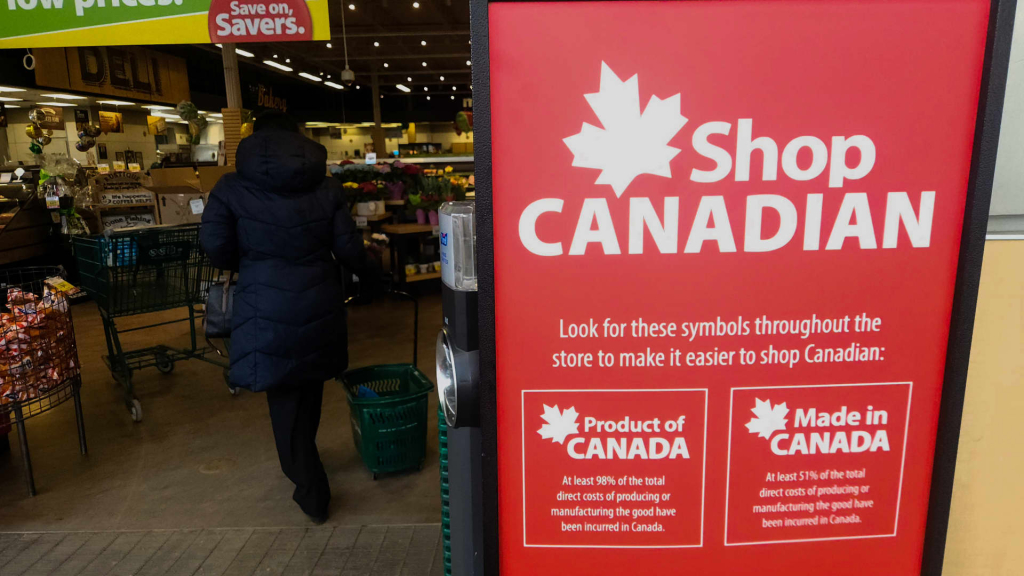In the wake of significant tariff impositions, small businesses situated near the U.S.-Canada border are expressing concern over the implications for their operations.
President Donald Trump has asserted that his extensive tariffs, which include measures against some of the nation’s closest trade allies, will restore balance to international trade and stimulate domestic manufacturing. However, these tariffs are raising concerns about diminishing trust among U.S. and Canadian trade partners.
The economic ties between the U.S. and Canada have been a cornerstone of both nations’ economies. In 2024, the trade volume between the two amounted to an impressive $762.1 billion. Data from the Office of the United States Trade Representative shows that Canada sent more than 75% of its goods to the U.S. last year, while nearly half of all goods Canada imported originated from the United States.
Beginning in March, the Trump administration imposed a 10% tariff on Canadian energy and 25% on various other imports from Canada and Mexico, a promise made on Inauguration Day. Many items covered under the United States-Mexico-Canada Agreement were exempted from these tariffs.
Furthermore, a 25% tariff on vehicles not manufactured in the U.S. went into effect earlier this month, impacting both Canada and Mexico—two key players in the automotive industry. Additional tariffs on auto parts are scheduled to be implemented next month.
In retaliation, Canada has initiated its own tariffs, but beyond government responses, a spirit of national pride is fostering alternative forms of resistance.
Balzac’s Coffee Roasters, a café chain across Ontario and Toronto, has rebranded its Americano as the “Canadiano,” emblazoning it with a maple leaf to reflect the trade tensions.
Your Independent Grocers, a network of independents operating under the Canadian-based Loblaw Companies, has introduced a maple leaf symbol to denote products “prepared in Canada.” The grocery chain also marks items affected by tariffs with a “T” symbol both in-store and online.
Corinne Pohlmann, executive vice president of advocacy at the Canadian Federation of Independent Business (CFIB), represents over 100,000 small businesses across 12 Canadian provinces and territories.
According to a December 2024 survey, around half of CFIB members are involved in some form of importing or exporting to the U.S., not accounting for their suppliers and clientele engaged in U.S. trade.
More than 25% of CFIB members reported an upsurge in demand for Canadian-made products, while over half of those surveyed indicated skepticism regarding the reliability of the U.S. as a trading partner.
Pohlmann noted that the ongoing trade tensions have strained long-standing business relationships between U.S. and Canadian small enterprises, with many entrepreneurs reconsidering how to manage the costs associated with new tariffs. Some CFIB members have sought advice on contract renegotiations with U.S. partners.
She emphasized that the tariffs are inducing not only financial strain but also emotional distress among Canadian businesses. “For a lot of Canadians, it felt like a betrayal,” Pohlmann remarked.
The Liquor Control Board of Ontario (LCBO) has ceased its purchases of American products since March 4. In its retail outlet in Niagara-on-the-Lake, a sign declares, “For the good of Ontario, for the good of Canada,” signaling the absence of U.S. brands such as California wines and Tito’s Vodka.
The situation, however, is not entirely straightforward.
A spokesperson for the LCBO clarified in an email to Finance Newso that any product manufactured in Canada, including locally brewed Coors Light beer, remains available on shelves, irrespective of the ownership structure.
Molson Coors operates production facilities in both Canada and the U.S., reinforcing the complexity of the current landscape. “While we are a global business, our beers are generally produced in the markets where they are sold,” stated Molson Coors Senior Director of Communications, Rachel Gellman Johnson.
Tariffs are generally seen as instruments of “hard power,” aimed at inciting geopolitical change through coercive measures. However, longstanding relationships between the U.S. and trading partners like Canada, Mexico, and Japan have also contributed to America’s global influence.
Beyond mere statistics, the implications for U.S. soft power may also be at stake. Former Secretary of State Antony Blinken expressed concerns during an interview with Finance Newso’s Andrew Ross Sorkin, suggesting that harm to soft power could be detrimental internationally. “The idea that we would not only see China try to develop more soft power, but that we would cede our own… is concerning for our country and our interests,” Blinken articulated.
Even if the Trump administration were to reduce tariffs, Canadian enterprises may remain cautious in re-establishing trading ties with U.S. partners. Pohlmann acknowledged the loss of contracts and the deterioration of trust as ongoing challenges.
“While we’d welcome a permanent reprieve from tariffs, the trading relationship between Canada and the United States has been fractured and may never recover,” she commented.


























